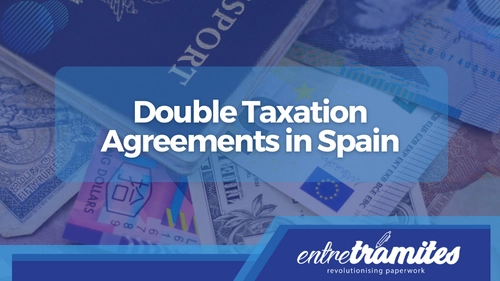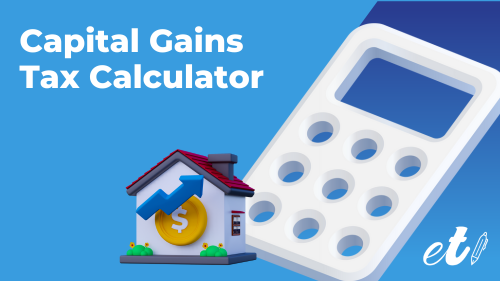Entre Trámites » Taxes in Spain » Tax Advice for US Expats in Spain
Tax Advice for American Expats in Spain
Tax Guide for US Expats in Spain
Empower your financial journey with our tax consultation service. Receive expert insights and read our informative guide to ensure your financial well-being in Spain.

tax guide spain uSA
With Spain emerging as a top destination for global relocations, expats, especially those with substantial assets, often find it challenging to stay updated on the evolving tax regulations set by the Spanish government. For US nationals aspiring to relocate, whether for work, family, or retirement, taxation emerges as a primary concern.
Differences in tax rates, calculation methods, and new tax categories make it essential for US expats in Spain to seek expert guidance. Keep reading our guide to know the main Spanish taxes and deductions that may apply to you!

In Spain, the tax year aligns with the calendar year, going from January 1st to December 31st. Spanish tax residents must submit their annual tax declarations, represented by the Modelo 100, from April 6th to June 30th of the subsequent year.
In the United States, the tax year, also known as the accounting period, can take on several forms:
Calendar Year: This is the most common and spans from January 1st to December 31st.
Regular Fiscal Year: This is a 12-month period ending on the last day of any month except December.
52-53 Week Fiscal Year: This doesn’t necessarily end on the last day of a month.
Short Tax Year: In certain circumstances, a tax year of less than 12 months may be required.
Remember, once a tax year type is chosen, IRS approval is needed to change it, which involves filing Form 1128. The tax return due date varies depending on the type of tax year and the specific tax forms used.
Am I a tax resident in spain?
Tax residency refers to the nation where you predominantly reside, submit tax returns, and fulfill tax obligations. For US expats in Spain, this holds immense significance as it dictates the extent of their tax liability and the application of national regulations. If you meet one of these requirements, you are regarded as a fiscal resident in the country:
- If you have spent more than 183 days in Spain within a single calendar year, irrespective of formal registration.
- If your primary professional activities are conducted in Spain (as an employee or self-employed in Spain).
- If your key interests, such as your spouse or dependent children, reside in Spain.
What are the Spanish Taxes I have to pay?
The Personal Income Tax, also known as “Impuesto sobre la Renta de las Personas Físicas (IRPF)” applies to those classified as tax residents in Spain are responsible for paying income tax on their global earnings after taking into account their personal deductions.
It is also crucial to know your tax residency status in Spain, as it determines the corresponding Spanish income tax you must pay.
Spanish tax rules classify income into two primary categories:
General Income:
- Salaries (as employee or as self-employed).
- Pension income.
- Rental income.
- Royalties.
- Other gains, such as proceeds from gambling or lotteries.
Savings Income:
- Earnings from interest.
- Dividend payments.
- Annuity income.
- Income from life assurance contracts.
- Capital gains resulting from the sale or transfer of assets.
Currently, the personal income tax rates for 2023 (declared in 2024) are:
| Annual income range | % Withholding |
|---|---|
|
Up to 12,450 euros |
19% |
|
From 12,450 to 20,199 euros |
24% |
|
From 20,200 to 35,199 euros |
30% |
|
From 35,200 to 59,999 euros |
37% |
|
From 60,000 to 299,999 euros |
45% |
|
More than 300,000 euros |
47% |
Deductible Expenses and Exemptions for US Expats in Spain
US expatriates living in Spain can generally claim tax deductions for the following: payments to Spanish social security, pension contributions, expenses related to the purchase and renovation of their main residence, and charitable donations. Additionally, the US – Spain Tax Treaty allows American expats to avoid double taxation, which will be explained below. These are the most common ones you can apply for:
General Personal Exemption:
Residents in Spain have the right to different Spanish tax deductions. The general personal exemption for everyone under the age of 65 is set at €5,550, or €6,700 from age 65, and €8,100 from age 75.
Spain’s Digital Nomad Visa:
This visa comes with a flat rate of 24% on work-related income up to €600,000 (beyond that, you pay 48%). At least 80% of your income must come from outside of Spain, and as a digital nomad, you are exempt from the Spanish wealth tax. If you need more information, you can schedule a free consultation!
Foreign Earned Income Exclusion and Foreign Tax Credit:
Many Americans living abroad qualify for special tax benefits, such as the foreign earned income exclusion and foreign tax credit, but they can only get them by filing a U.S. return.
Tax Incentives for US Expats in Spain
Beckham Law: Under the Beckham Law, expats can opt to pay a flat tax rate of 24% on their income earned in Spain, rather than the progressive tax rates ranging from 19% to 45%.
- The benefit of the fixed tax rate applies for a maximum period of six years from the year of registration as a Spanish tax resident. After this period, the individual is subject to standard progressive income tax rates.
- To be eligible, an individual must not have been a tax resident in Spain in the five years before taking up residence in the country.
- Under the Beckham Law, only income generated within Spain is subject to taxation. This includes income from employment, business activities, and real estate located in Spain.
- Individuals benefiting from the Beckham Law are required to file an annual tax return declaring their income. This includes details of income from all sources, both within and outside Spain.
Special Tax Regime for Inbound Expatriates: As of 2023, highly qualified professionals, entrepreneurs, and remote workers using IT and telecommunications can benefit from a special tax regime. This includes a reduced tax rate and the possibility for spouses and children to also apply for the regime.
Non-Resident Income Tax (IRNR): Individuals who move to Spain and acquire tax residence in Spain may opt to be taxed under the Non-Resident Income Tax (IRNR) rules instead of being taxed under the Spanish Personal Income Tax rules. This would imply being taxed at a flat rate of 24% on Spanish-source employment income up to EUR 600,000.
Spain USA Double Taxation Treaty
The Double Taxation Treaty between the U.S. and Spain prevents double taxation on the same income. The treaty includes protocols for tax evasion prevention. The U.S. has similar treaties with other countries, offering reduced rates or exemptions. The latest treaty with Spain came into force on November 27, 2019, benefiting professionals and investors. We offer you some examples:
- Rental Income: Let’s say an American owns a property in Spain and earns $20,000 in rental income. According to the treaty, income generated from real property such as rental income can be taxed by both countries. Therefore, this income could be subject to tax in Spain (where the property is located) and in the U.S. (where the citizen resides). However, the taxpayer may be able to claim foreign tax credits on their U.S. tax return for taxes paid in Spain, reducing their U.S. tax liability.
- Capital Gains: Now, consider an American who sells shares of a Spanish company and makes a capital gain of $50,000. The new treaty has eliminated taxation on capital gains from the source country. They can now only be taxed in the state of residence. Therefore, this capital gain would typically be taxable only in the U.S., where the citizen resides. The exception to this rule is if the principal asset of the company is real estate (directly or indirectly).

Do you still have questions about the taxes you have to declare in Spain? Talk to an expert here!
Taxing Assets: Capital Gains, Wealth Tax and Modelo 720
Maximize your financial planning with a detailed look at these taxes to be paid in Spain:
Capital Gains Tax:
Capital gains are integrated with personal income tax (IRPF) and taxed progressively. The rates for 2023 are:
- 19% on gains up to €6,000.
- 21% on gains between €6,000 and €50,000.
- 23% on gains between €50,000 and €200,000.
- 27% on gains between €200,000 and €300,000.
- 28% on gains over €300,000.
The following 4 types of capital gains fall under dual taxation in both the United States and Spain, allowing taxpayers to leverage the international double taxation deduction:
- By the sale of shares, excluding those traded on the stock market or similar rights. It's relevant when the value of these shares is mainly derived (50% or more) from real estate assets in the US.
- By the sale of US real estate rights.
- By the sale of immovable assets, regardless of their specific nature.
- By the sale of movable assets that are part of a permanent establishment in the United States. It can be eligible for double taxation if these assets are used for economic activities.
Wealth Tax (Impuesto sobre el Patrimonio):
All incomes derived from the ownership of a property in the United States are subject to taxation in both Spain and the US. However, individuals classified as fiscal residents have the right to invoke the international double taxation deduction, ensuring that they do not incur the same tax percentage twice on their income.
Wealth tax ranges from 0.2% to 2.5% and is applied to the net value of assets owned on December 31st each year.
Regional Variations: Some regions have different rates and thresholds. For example, Madrid and Andalucía apply a 100% wealth tax relief, effectively a 0% rate.
Modelo 720 to Declare Foreign Assets:
The Modelo 720 is an annual obligation for Spanish residents to disclose international assets falling under specific categories:
- Assets held in any bank accounts.
- Property located in a foreign country.
- Overseas securities or shares.
- Life insurance policies.
If the combined value of assets in these categories exceeds €50,000, the report must be submitted by December 31st.
While not required annually, resubmission is necessary if asset values increase by over €20,000 from the original filing. A new form must also be submitted for any sold assets or closed accounts.
Save Time And Money with Entre Trámites!
Experience a smooth and efficient journey and consulting about handling your Spanish taxes. Our streamlined process not only saves you precious time but also ensures cost-effective solutions.

Schedule a consultation with our tax expert
Complementary Services
That may be useful to you
Here's What They Say About Us
Content To Keep You Updated
FAQ
General Info
Yes, as a US citizen, you’re required to report your worldwide income and assets to the IRS, regardless of where you live. Failure to comply with these requirements can result in severe consequences, including penalties and interest.
Yes, US expats in Spain may need to file an FBAR or Form 8938. These forms are required by the US government to report foreign financial accounts and assets. Failure to file these forms can result in severe penalties.
Yes, Spain imposes taxes on gifts and inheritances. The tax rates and exemptions depend on the relationship between the donor/deceased and the recipient/heir. Spouses and children generally enjoy more favorable tax treatment, with varying regional regulations influencing the final tax liabilities. Check more about this subject on Inheritance Tax in Spain!
Expats with children in Spain should be aware of child allowances and deductions. The number of children and dependency status can affect personal allowances, potentially reducing the overall tax liability. Additionally, there might be specific deductions related to education and childcare expenses.
If you’ve overpaid taxes in Spain, the process involves filing an amended tax return or submitting a claim for a refund. The specific procedure can vary based on the nature of the overpayment. You can solve all your doubts in a free consultation.
Cryptocurrency gains are subject to taxation in Spain. The Spanish Tax Agency considers cryptocurrencies as taxable assets, and capital gains derived from their sale or transfer are subject to capital gains tax. It’s crucial to keep detailed records of cryptocurrency transactions for accurate tax reporting. In our website you can find a Crypto Tax Calculator.
Payment
The price you see when you schedule your online consultation is the final one: 50€ (+plus 21% VAT included).
You can pay using a debit or credit card.
We will refund the cost of your online consultation in the first invoice if, after the first month, you contract any Entre Trámites service whose price is higher than 300€ + VAT.
Our
Team
When you book your online consultation, you will be contacted by an experienced advisor.
It is important that you specify in the description of the consultation the exact subject/procedure you wish to discuss so that our team can prepare the meeting and provide you with all the answers and resources specific to your situation.
You can choose how you want to make the online consultation: by phone or video call through Google Meet (included in your Gmail).
We also show you the available schedules of our advisors so that you can choose the one that best suits your calendar.
We want to listen to you and know what your doubts are or what you need in relation to our services. You can count on the advice of our experts to clarify all your doubts.
Write to us at [email protected] and we will contact you as soon as possible or, if you prefer, call us.




